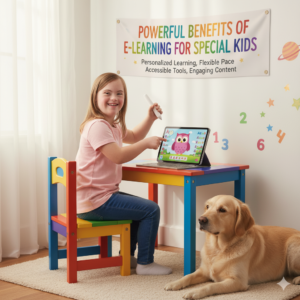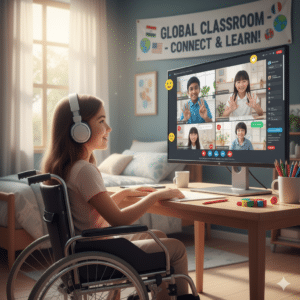Parents raising neurodivergent children know that traditional classrooms often don’t address their child’s unique learning needs. That’s where e-learning steps in. With the rise of free digital education platforms and interactive online learning tools, children can now access personalized learning that works with their strengths instead of against them.
Let’s break down the benefits, tools, and strategies of digital education for special kids, explore how fun educational games make learning engaging, and answer common questions parents ask when exploring e-learning solutions.
The truth is, education should never be one-size-fits-all. Many special kids struggle in environments that move too fast, lack flexibility, or fail to provide sensory-friendly learning experiences. Online learning for children provides a space where they can learn at their own pace, use tools tailored to their needs, and develop essential skills through fun, interactive methods.
Here’s why this matters:

E-learning creates a custom pathway for each child. Special kids often require a slower pace or alternative explanations to grasp concepts. Online platforms provide adjustable difficulty levels, video lessons, interactive exercises, and the ability to pause and replay until mastery is achieved. This is especially helpful for kids with ADHD, dyslexia, or autism, who benefit from repetition and clarity. Parents can even tailor the curriculum to highlight a child’s strengths, making learning empowering instead of frustrating.
Not every family has the means to pay for private tutors or expensive special education programs. Fortunately, many platforms now provide free education for children. Sites like E-Learning for Kids and Khan Academy open doors to subjects like math, science, and language in ways designed for all learners. This reduces inequality in education and ensures that childhood learning online is available to anyone with internet access.
Children learn best when they are having fun. Interactive animations, puzzles, and fun educational games transform boring lessons into exciting adventures. For instance, math can be taught through treasure hunts, while language skills can be developed through storytelling games. This makes learning less about memorization and more about curiosity and engagement. For special kids who often struggle with focus, gamified learning sustains their attention much longer.
Childhood learning online introduces children to global content and ideas that they might not encounter in traditional classrooms. Lessons can be designed with visuals, audio, and interactive tasks, making complex subjects easier to understand. For example, a child struggling with fractions can watch animated pizza-slice lessons repeatedly until the concept clicks. This flexibility fosters independence and allows children to explore new interests beyond the school curriculum.
One of the hidden strengths of e-learning is the built-in progress tracking systems. Special kids often feel left behind in traditional classrooms. Online platforms allow them to see badges, points, or progress bars reflecting their effort and growth. This visual proof of improvement builds motivation and self-esteem. Parents can also monitor results and celebrate milestones—small victories that matter greatly for a child’s emotional development.
Schedules in traditional schools can feel rigid and overwhelming. E-learning provides the freedom to learn when the child is most focused—whether that’s early morning or late afternoon. Parents can integrate learning sessions with therapy, medical appointments, or playtime. This creates a balanced routine that reduces stress for both child and family. The flexibility also ensures fewer missed learning opportunities due to fatigue, illness, or sensory overload.
The internet makes it possible for children with special needs to connect with peers across the globe. Virtual classrooms often have features like closed captions, chat-based participation, and visual aids that make inclusion easier. This opens opportunities for friendships and cultural exchange while removing geographical limitations. By engaging in internet education, children learn social interaction skills in a safe and controlled environment.

In many areas, access to teachers trained in special education is limited. Online learning platforms allow parents to connect with skilled educators worldwide. Whether it’s a reading specialist for dyslexia or a therapist for speech delays, the digital education platform creates opportunities for targeted, professional support. This ensures that children are not restricted to the resources of their local schools.
Crowded classrooms, constant competition, and fast-paced lessons can overwhelm children with sensory sensitivities or learning challenges. E-learning reduces unnecessary stress by offering learning in safe, familiar environments. Children can take breaks when needed, avoid overstimulation, and progress without the fear of public failure. This fosters a positive association with education and reduces the risk of school-related anxiety.
The world is becoming increasingly digital, and special kids deserve the same opportunities to succeed. By using digital education platforms, children not only gain academic knowledge but also essential life skills such as typing, navigating online tools, and problem-solving in a virtual environment. These skills prepare them for future education, career opportunities, and independence in a tech-driven society.
1. Is e-learning effective for children with ADHD or autism?
Yes, because it provides flexible pacing, visual tools, and sensory-friendly learning environments.
2. Are there free education worldwide options for special kids?
Absolutely. Platforms like E-Learning for Kids and Khan Academy offer free resources accessible globally.
3. How do fun educational games help with learning?
They turn lessons into interactive experiences, improving retention, focus, and motivation.
4. Can online learning for children replace traditional schooling?
It depends. For some kids, it supplements school. For others, it becomes the primary mode of education.
5. What role do parents play in digital education?
Parents act as guides, ensuring children stay engaged, balance screen time, and get the support they need.
E-learning for special kids isn’t just about technology—it’s about equity. Every child deserves access to education that fits their unique way of learning. Whether it’s through free digital education resources, fun educational games, or structured childhood learning online, parents now have more tools than ever to help their children thrive.
Education should be empowering, not limiting. With e-learning, we’re moving closer to a world where every child, no matter their needs, can access opportunities and unlock their full potential.